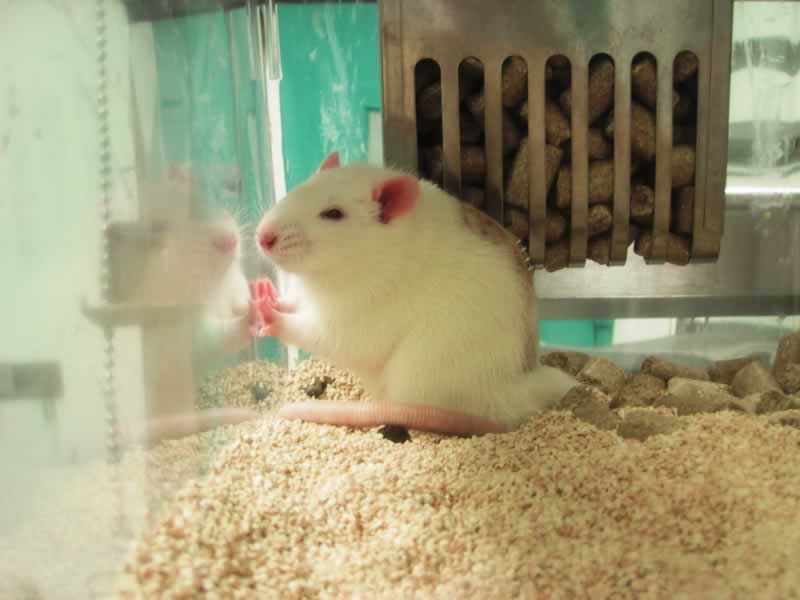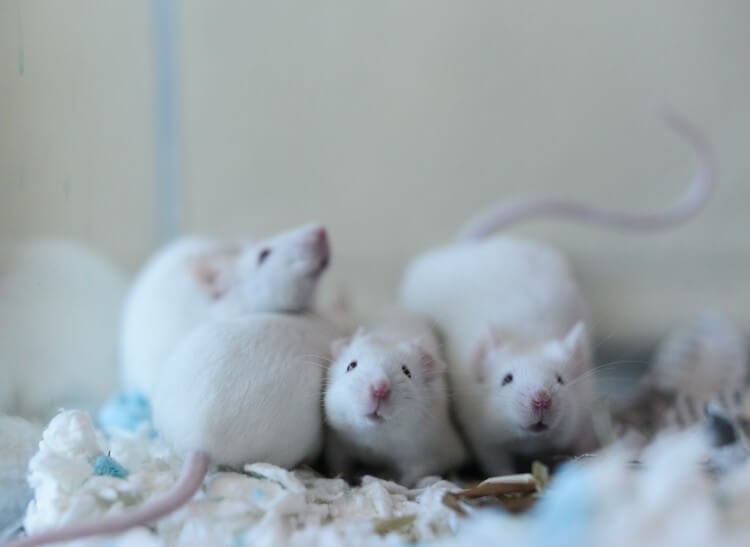The post Old Dominion University appeared first on PETA.
Feds’ Paltry Fine Against Labcorp Is Little Compensation for Gruesome Monkey Deaths
Please see the following statement from PETA Senior Science Advisor Dr. Lisa Jones-Engel regarding the U.S. Department of Agriculture’s recent settlement with Labcorp Inc. for five serious violations of the federal Animal Welfare Act, including the deaths of four monkeys, one at the company’s Somerset facility:
The U.S. Department of Agriculture’s anemic fine of $9,000 levied against Labcorp is a pittance for the agony animals endured at the hands of incompetent staffers, leading to the deaths of four macaque monkeys. Labcorp is clearly unable or unwilling to uphold even the most basic standards of animal care, and its animal labs, such as its facility in Somerset, should be shut down permanently.
Between May 2019 and February 2022, Labcorp staffers broke the bones of five monkeys because they didn’t handle them properly. Three of those monkeys died as a result of the injuries. A sixth monkey, at Labcorp’s Somerset facility, slowly wasted away for months while staffers did nothing to report the illness to a veterinarian. That monkey was killed, according to the USDA report.
Labcorp must modernize its laboratories; replace cruel, archaic experiments on animals with sophisticated, human-relevant research methods; and implement the strategy proposed in PETA’s Research Modernization Deal.
PETA—whose motto reads, in part, that “animals are not ours to experiment on”—opposes speciesism, a human-supremacist worldview. For more information, please visit PETA.org, listen to The PETA Podcast, or follow the group on X (formerly Twitter), Facebook, or Instagram.
The post Feds’ Paltry Fine Against Labcorp Is Little Compensation for Gruesome Monkey Deaths appeared first on PETA.
PETA Demands Answers About Horse’s Condition After Injury on Breeders’ Cup Day
Where is Bus Buzz? PETA was there when the 3-year-old horse sustained an injury on Friday, November 3, on the first day of the Breeders’ Cup World Championships at Santa Anita Park in California. We know he incurred a foreleg injury that required that the affected joints be fused. A brace was placed on his front left leg, and he hobbled onto the horse ambulance. It was later announced that he was slated to undergo urgently needed surgery on that Sunday.
Was Bus Buzz’s Surgery Successful?
Sunday has come and gone, but Bus Buzz’s owners, trainer, and the Breeders’ Cup organization haven’t shared any update on his well-being, let alone proof of life. We need to know: Is Bus Buzz still alive?
PETA caught the entire incident on video—and it appears serious. We’re demanding accountability from those involved.
We need answers!
Bus Buzz supposedly underwent surgery on Sunday, but no statements have been made since about his injury or recovery. We will not forget about him! pic.twitter.com/xKAf4WhN4i
— PETA (@peta) November 7, 2023
Carnage in California
At least 72 horses have died in California from racing injuries so far this year. We’re hoping Bus Buzz isn’t another fatality.
While California has led the way in passing measures to protect horses, it has stopped far short of all that’s needed, beginning with the immediate suspension of the trainer when a horse dies and the installation of low-radiation, standing CT imaging equipment that can be used to screen horses for injuries. If the deaths don’t end, the racing must.
Help Bus Buzz and Other Horses Across the U.S.
If the owner, the trainer, and the track are hoping we’ll forget about Bus Buzz, that’s not going to happen. They need to come clean now and tell the public what happened to this horse.
Please take just a moment to make timed “breezes” safer for juvenile horses:
The post PETA Demands Answers About Horse’s Condition After Injury on Breeders’ Cup Day appeared first on PETA.
The American Psychological Association Advocates Killing Animals in New Article
The American Psychological Association (APA) apparently believes that breakthroughs in treating mental health problems in humans will come only if experimenters are allowed to kill more animals.
The folks at the APA need their heads examined.
In a recent article published on its website, the APA outlines its wrongheaded stance on animal experimentation, making it clear that the organization is no fan of compassionate research methods and lauding animal testing as the best and most reliable method to achieve success in treating human maladies.
The APA’s article, titled “Urging NIH to Resist Hype of Alternatives to Animal Studies,” calls on the National Institutes of Health (NIH) to encourage more cooperation between monkey experimenters and developers of non-animal alternatives, further throwing its lot behind pointless and deadly experiments.
This is a curious departure from the organization’s stance in 2012, when its own ethics guidelines advocated considering non-animal methods. “Consideration should be given to the possibility of using non-animal alternatives. Some procedures that can be justified for research purposes may not be justified for educational purposes,” reads the APA’s Guidelines for Ethical Conduct in the Care and Use of Nonhuman Animals in Research.
But the APA’s new position urges NIH “to continue to let scientific opportunity and effectiveness drive the research funded by the agency and not to be pressured by the advocacy of anti-animal research organizations working through their congressional champions.”
We agree with the first half of this sentence but not the second.
For decades, PETA has urged NIH to follow the science. And the agency even admits that 95% of all new drugs that are shown to be safe and effective in tests on animals fail in human trials because they don’t work or are dangerous. These aren’t winning numbers.
Here are some other facts that the APA may want to chew on before spitting out more baseless drivel:
- More than 90% of basic scientific discoveries, most of which are from experiments on animals, fail to lead to human treatments.
- Eighty-nine percent of preclinical studies, most of which involve animals, can’t be reproduced.
- In a recent analysis of “rodent behavioural tests of anxiety,” researchers found that the vast majority of tests lacked scientific validity and weren’t able to predict which drugs would relieve anxiety in humans.
- In a survey of 121 animal studies claiming to investigate attention-deficit/hyperactivity disorder (ADHD), only five were found to be in any way relevant to the hypotheses of the medical articles in which they were cited. The authors of the survey concluded that “animal research has contributed very little to contemporary understanding of ADHD.”
- Experiments on animals have been cited as the primary source of drugs’ failure in human neurobehavioral trials. The primary reason? Even though animals feel many of the same emotions that we do, their brains are fundamentally different in ways that are critically important in biomedical and molecular research. For example, the brain cells in mice that respond to drugs meant to treat depression, anxiety, and bipolar disorder are drastically different from those in humans.
More Effective Animal-Free Research Methods Exist
Reliable and economical non-animal methods are readily available for a variety of testing applications. Many basic scientific and disease studies that use animals—which fail to accurately translate to humans—can be replaced with organ-on-chip technology, sophisticated computer simulations, 3D cultures of human cells, epidemiological studies, and other more superior modern methods.
The results from these methods are directly applicable to humans, speeding the process toward pharmaceutical discovery and commercialization. But while organizations such as the APA continue to advocate for demonstrably ineffective science that slows the development of treatments for people who continue to suffer, these more effective, ethical, and economical animal-free methods are starved for resources.
What You Can Do
Please TAKE ACTION and urge your members of Congress to support PETA scientists’ Research Modernization Deal. Backed by thousands of physicians, it maps out a strategy for replacing the use of animals in experiments with human-relevant methods.
The post The American Psychological Association Advocates Killing Animals in New Article appeared first on PETA.
Rest Your Weary Head at These Vegan Hotels and Inns
Your hotel can make or break your vacation, so it’s important to find the right one—and that includes considering the impact your stay will have on animals. Luckily, there are vegan hotels that offer animal-free menus, cruelty-free toiletries, and down- and wool-free bedding in some of the most beautiful places in the world. By booking your stay at one of these mindful establishments, you can rest easy knowing that your choice will spare the lives of countless animals.
Let loose while keeping animals in mind at one of these 100% vegan hotels:
Beck Hall (Malham, United Kingdom)
Situated in picturesque rural England, Beck Hall is the country’s first all-vegan hotel. Its 20 rooms are tastefully decorated, complete with down-free bedding and cruelty-free toiletries. The streamside restaurant offers complimentary daily breakfast and traditional British fare, such as Sunday roasts and afternoon tea.
Koukoumi Vegan Hotel (Mykonos, Greece)
Located in the quiet inland village of Ano Mera in Mykonos, Koukoumi Vegan Hotel offers modern luxury amenities with animals and the planet in mind. Its restaurant features a unique nine-course fine-dining experience that mixes the flavors of the Mediterranean with Japanese-inspired recipes.
MOD Santorini (Firostefani, Greece)
Perched atop the cliffs of Santorini, this boutique hotel merges contemporary elegance with the island’s timeless allure. Indulge in gourmet vegan Mediterranean food, relax in a private outdoor hot tub, and enjoy a guided vegan food and wine tasting surrounded by the beauty of the island. The MOD concierge also offers travel experiences, including a private catamaran cruise and scuba diving.
Mother Earth Luxury Boutique Hotel (Tamarindo, Costa Rica)
If you’re looking for a relaxing retreat, book a stay at Mother Earth Luxury Boutique Hotel. This eco-friendly vegan hotel features spacious rooms, yoga classes, and massages. Enjoy breakfast at its poolside vegan restaurant before spending the day exploring the beautiful Costa Rican beaches.
The Stanford Inn by the Sea (Mendocino, California)
The Stanford Inn by the Sea is a small getaway on the coast of Northern California that offers cozy rooms and suites designed with animal-free decor and a variety of amenities, such as a solarium, a heated saltwater pool, a sauna, yoga classes, and massage services. The on-site Ravens Restaurant features local seasonal fare and complimentary afternoon tea.
LA VIMEA Vegan Hotel (Naturno, Italy)
Perfect for a romantic getaway or a solo retreat, LA VIMEA is a vegan sanctuary where you can relax and enjoy its many amenities, including yoga, meditation, and massages. Its vegan restaurant is 100% organic, with a rotating daily menu that highlights seasonal flavors.
Volcano Eco Retreat (Mountain View, Hawaii)
At Volcano Eco Retreat, you can explore the majesty of the Big Island by day and return to an eco-friendly sanctuary at night. Wake each day to enjoy a made-to-order vegan breakfast, with freshly brewed Kona coffee and the sweetest selection of Hawaiian fruit.
Willka T’ika (Cusco, Peru)
From yoga retreats to healing ceremonies, Willka T’ika is more of a spiritual experience than simply a resort. Its location in Peru’s fertile Sacred Valley allows guests to explore the history of the area along with its stunning scenery, all while enjoying animal-free meals.
The Yucca (Desert Hot Springs, California)
The Yucca is your gateway to the Coachella Valley, located between Joshua Tree National Park and Palm Springs. Its luxury, adult-only accommodations are designed to be sustainable and animal-friendly, with vegan meals and cruelty-free spa services.
This list is by no means extensive. Search VeggieHotels to find many other vegan and vegan-friendly hotels, inns, and bed-and-breakfasts worldwide.
Whether you’re looking for a smooth time at the airport or helpful trip tips, PETA has you covered.
The post Rest Your Weary Head at These Vegan Hotels and Inns appeared first on PETA.



